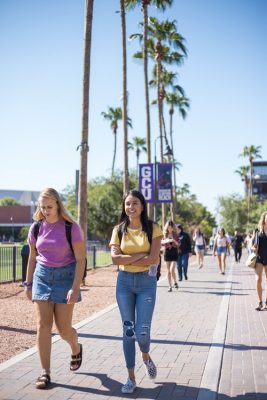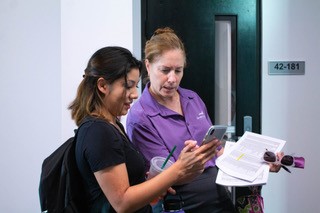
By Rick Vacek
GCU News Bureau
When someone says, “I’ve got connections,” it usually means they know people in high places. At Grand Canyon University, it means they have connections all over the place.
As more than 7,000 new students officially merged into the student body when classes started Monday morning, they were greeted by an important directional sign -- the First-Year Experience (FYE).
Every administrator, every faculty member, every Life Leader and every Learning Advocate (LEAD) from every college within GCU is dedicated to an initiative designed to make sure new students get the academic and counseling help they need. Like a road sign, it shows them which way to go.

“The whole thing is for students to make contact and form a relationship with somebody,” GCU Provost Dr. Hank Radda said. “Is it faculty, a Life Leader, someone who can provide academic help? We know that if they make connection with someone, they’re more likely to get into the program and feel supported.”
Students are urged to visit one of the 15 Academic & Career Excellence (ACE) Centers spread across campus, some of them specialized for a particular college but all of them offering complete services, with faculty often on hand as well.
The FYE hub is in the College of Humanities and Social Sciences (Building 16), which also will service students in CHSS and the College of Education. Students are urged to visit there as soon as possible just to see what FYE and ACE are all about.
The other ACE Center locations and their colleges, where applicable:
- Encanto Apartments (Building 27): College of Theology, College of Fine Arts and Production
- Roadrunner Apartments (Building 28): College of Nursing and Health Care Professions; College of Science, Engineering and Technology; and College of Doctoral Studies
- Agave Apartments (Building 41): Colangelo College of Business
- Diamondback Apartments (Building 50): Math
- Jerome Apartments (Building 54): Writing
- Willow Hall (Building 81): General info (one for men, one for women)
- Acacia Hall (Building 82): General info (one for men, one for women)
- Ironwood Hall (Building 83): General info (one for men, one for women)
- Juniper Hall (Building 84): General info (one for men, one for women)
- Saguaro Hall (Building 46): General info, staffing hub
- Off campus: Online
The hours of all the ACE Centers are:
- Monday-Thursday: 8 a.m.-midnight
- Friday: 8 a.m.-5 p.m.
- Saturday: 10 a.m.-4 p.m.
- Sunday: 5-10 p.m.
Also available are these two centers:
- Writing Center (Building 33, Room 132): 7 a.m.-4 p.m. Monday-Friday; emphasis on ENG 105 and 106 and UNV 100; at least one full-time faculty member available at all times
- Math Center (Building 16, Rooms 202/204): 8 a.m.-6 p.m. Monday-Thursday, 8 a.m.-5 p.m. Friday (appointments preferred Friday); available to all students for any courses that utilizes math; at least one full-time faculty member available at all times
The ACE Centers are under the direction of Dr. Joe Veres, Vice President of Student Development and Outreach. They formerly were called Learning Lounges, but that name now applies only to GCU’s centers of academic help for K-12 students in the surrounding neighborhood.

“GCU’s Academic & Career Excellence Centers are the epitome of concierge service,” Veres said. “Our Learning Advocates (LEADs) are strategically placed at the ACE Centers based on their college and program of study to offer students assistance on everything from academic support, purpose planning, career and internship support, job staffing, an SSC hotline, scholarship service hours, and much more.
“The biggest benefit for our staff and students is we know have one place students are able to access for ‘everything.’”
The new piece in the ACE Centers is the direction toward a productive career. GCU’s curriculum is designed to give students the hands-on knowledge they need to thrive in the working world, and the ACE Centers, in turn, are designed to get that process started early.
“It’s a more holistic approach, a one-stop shop for students,” said Dr. Antoinette Farmer-Thompson, Senior Vice President, Institutional Effectiveness, and Dean of the Honors College. “We made the adjustment because we saw that students really were drawn to the Academic Excellence Centers.
“We wanted that same traffic and to drive those same messages to the students everywhere, so we merged the concept. It just made sense because, as an academic team, we never look at just the academics of the student.”
Connecting an experienced GCU student to a freshman can be as simple as helping a newcomer with directions to a building. Rather than just tell them, “It’s over there,” it has been the practice of Veres’ team to have a “concierge service” – one or two LEADs walk the student to the location and strike up a conversation.
“Now you have a senior talking to a freshman,” said Radda, explaining how the conversation could lead to shared experiences about majors, goals, etc. “Those are things you can’t script. They’re real. We’re just doing a lot of those things to try to build the connection for students.”
It also is important for students to attend their individual college meetings in weeks 3 and 6 of the semester. The first meetings, designed to provide introductions and updates and create new connections, are:
- CCOB: 11:15 a.m.-12:15 p.m. Wednesday, Sept. 5, GCU Arena
- CONHCP: 5-7:30 p.m. Wednesday, Sept. 5, Arena
- CSET: 11:15 a.m.-12:15 p.m. Friday, Sept. 7, Arena
- COT: 5-7 p.m. Monday, Sept. 10, Arena
- CHSS: 11:15 a.m.-12:15 p.m. Wednesday, Sept. 12, Arena
- COE: 11:15 a.m.-12:15 p.m. Friday, Sept. 14, Arena
- COFAP: 11:15 a.m.-12:15 p.m. Friday, Sept. 14, First Southern Baptist Church
The second meetings, in week 6, will be dedicated to program focus and purpose planning.
Students who need help with LoudCloud can visit any ACE Center throughout the week for one-on-one assistance and also can go to the Library, on the third floor of the Student Union, at the following times:
- Monday, Aug. 27: 1-6 p.m.
- Tuesday, Aug. 28: 3-6 p.m.
- Wednesday, Aug. 29: 1-6 p.m.
- Thursday, Aug. 30: 3-6 p.m.
- Friday, Aug. 31: 1-6 p.m.
The opportunities for connection also extend to GCU’s five Living and Learning Communities (Honors, STEM, Nursing, Business and the newest one, Psychology), its 65 Learning Communities (up from 61 last year) and its 126 social and academic clubs. There also is the Success Patrol, which will have representatives stationed near the parking garages and on the Promenade. More than 50 academic team members will visit very classroom at least once.
There also will be efforts to help commuter students by bringing them together in various combination, such as commuters from the same part of the Valley. GCU’s Success Patrol also will be on duty again, ready to help.
Everywhere they turn, students should see the possibilities for making connections.
“We’re taking it to the students,” Farmer-Thompson said.
The signs are everywhere.
Contact Rick Vacek at (602) 639-8203 or [email protected].



































































